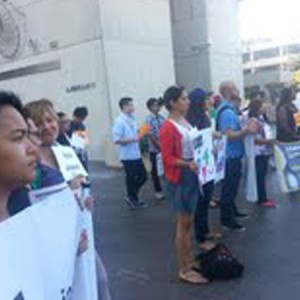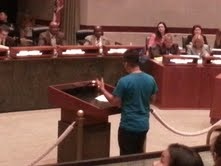Long Beach language policy aids limited-English speakers, including Filipinos

Various groups gather in front of the City Hall of Long Beach to press for a “language access” policy. PHOTO BY JOY PRIM
LONG BEACH, California–After two years of campaigning by various organizations for “language access,” the Long Beach city council adopted a language policy to improve immigrants’ access to the city’s services.
Long Beach has an estimated 20,000 Filipinos who are among the city’s nearly 250,000 Latino and Asian residents. Long Beach has a population of roughly 500,000. Some 5,000 Filipinos have limited English proficiency (or speak English less than well).
The coalition began a phone campaign to push Long Beach officials to release the language access policy draft, knowing that the most common languages spoken in the city are other than English, namely Spanish, Khmer and Tagalog.
Long Beach’s adopted language access policy allows room for refinement through quarterly compliance reporting to the city council at public hearings.
The broad coalition is made up of Legal Aid Foundation of Los Angeles; Building Healthy Communities Long Beach; East Yard Communities for Environmental Justice; Housing Long Beach; Long Beach Immigrant Rights Coalition; Educated Men with Meaningful Messages; Aikona; Filipino Migrant Center; Californians for Justice; United Cambodian Community; and Khmer Girls in Action.
“We realized that there was no real promise for language access for Khmer and Tagalog, and we reacted quickly to what these people need,” stated Alex Montances, Filipino Migrant Center staff representative who attended coalition meetings.
During citywide budget cuts, the council voted to eliminate aid to language access, while non-English-speaking residents continued to attend Long Beach public hearings to address their concerns.
“There were cases of monolingual people, like Khmer, at city meetings and with no interpreter made available by the council,” stated Susanne Browne, senior attorney with the Legal Aid Foundation of Los Angeles.

Alex Montances of the Filipino Migrant Center speaking to the City Council of Long Beach in support of translation services. PHOTO BY JOY PRIM
Translators and interpreters are needed to convey information accurately from one language to another in different settings and situations, so that minorities understand basic needs and services in health, work, education, food and housing services.
The LB Language Access Coalition stated that the city’s language policy will help residents become more aware of services, be more interested and less intimidated in city affairs as well as gain more visibility for their ethnicity.
“The truth is that Filipino-Americans in Long Beach are not as visible as they should be in the city,” says Montances. The language access campaign had no Filipino representation until Filipino Migrant Center joined the Long Beach Language Access Coalition in June this year.